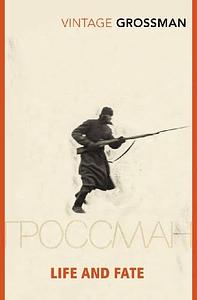Take a photo of a barcode or cover
challenging
emotional
slow-paced
Plot or Character Driven:
A mix
Strong character development:
Yes
Loveable characters:
Complicated
Diverse cast of characters:
Yes
Flaws of characters a main focus:
Yes
A sprawling panorama of Soviet society at the height of the Second World War. At times so depressing I had to put the book down and walk away. More than anything it’s about the dignity of the individual in the face of the barbarism of war and an inhuman state. Every character, no matter how unsympathetic their politics or actions, is imbued with a profound humanity. It’s long, it’s slow in places, but it’s infinitely rewarding. Read this book
Edit: on further reflection, I was perhaps too hasty to give this a perfect score. It is very long. Some chapters are the most heart wrenching you will ever read; others drag on for longer than you’d like. Grossman never got the chance to finish the book and it probably could’ve done with a bit of an edit, but even still it is a truly transformative read that still occupies a corner of my mind.
Edit: on further reflection, I was perhaps too hasty to give this a perfect score. It is very long. Some chapters are the most heart wrenching you will ever read; others drag on for longer than you’d like. Grossman never got the chance to finish the book and it probably could’ve done with a bit of an edit, but even still it is a truly transformative read that still occupies a corner of my mind.
adventurous
challenging
dark
emotional
hopeful
inspiring
sad
tense
slow-paced
Plot or Character Driven:
A mix
Strong character development:
Yes
Loveable characters:
Yes
Diverse cast of characters:
Yes
Flaws of characters a main focus:
Yes
My relationship with this book is complicated. At some point this book became "A book I must finish." And I'd struggle to read 6 pages a day. Then a dam broke and 100s of pages flowed past day after day, as though my siege of Stalingrad were lifted, and I joined the T-42s vanguard.
This is not an easy book to read. the pacing is uneven and many of the characters names are nearly identical.
This is not an easy book to read. the pacing is uneven and many of the characters names are nearly identical.
Vita e destino, seguito di Stalingrado, è veramente il Guerra e pace del Novecento.
Se lì il contesto storico era quello napoleonico, qui abbiamo quello della Seconda guerra mondiale.
Ma per il resto, a livello strutturale, i due capolavori hanno molti punti di incontro.
Grossman, a differenza di Tolstoj, si sofferma meno sulle strategie militari ma, come il primo, racconta tante vite, tante storie, che si possono anche leggere separatamente, come mini romanzi a parte. Esattamente come in Guerra e pace.
E gli stessi titoli, la Vita come Pace e il Destino della Guerra, appaiono complementari.
Lo stile di Grossman è tra i più poetici, commoventi ed emozionanti che abbia mai letto.
Ho amato soprattutto le sue descrizioni, specie quelle dei paesaggi tetri, ostici e deserti della steppa.
Per non parlare di scene come quelle nei lager o la lettera della madre di Strum.
Agghiaccianti.
Tra i libri più belli di sempre, sicuramente il libro dell'anno, insieme a Stalingrado.
Anche se quest'ultimo è più storico-narrativo e Vita e destino più filosofico, per me sono da considerarsi un unicum, una storia in due volumi.
È una storia sulla libertà individuale, quella di pensiero, quella che ti fa lottare contro il totalitarismo, sia esso nazista o comunista. È infatti incredibile la lucidità dell'autore nell'inquadrare in modo tanto chiaro la presenza di due e non un sol regime totalitario.
È una storia sulla bontà, quella che Ikonnikov definisce "illogica", quella che vince qualsiasi male. Quella di una anziana che dà un tozzo di pane a un soldato e offre ciò che possiede a chiunque incroci la sua strada.
Leggete questa storia. La porterete nel cuore per sempre.
Se lì il contesto storico era quello napoleonico, qui abbiamo quello della Seconda guerra mondiale.
Ma per il resto, a livello strutturale, i due capolavori hanno molti punti di incontro.
Grossman, a differenza di Tolstoj, si sofferma meno sulle strategie militari ma, come il primo, racconta tante vite, tante storie, che si possono anche leggere separatamente, come mini romanzi a parte. Esattamente come in Guerra e pace.
E gli stessi titoli, la Vita come Pace e il Destino della Guerra, appaiono complementari.
Lo stile di Grossman è tra i più poetici, commoventi ed emozionanti che abbia mai letto.
Ho amato soprattutto le sue descrizioni, specie quelle dei paesaggi tetri, ostici e deserti della steppa.
Per non parlare di scene come quelle nei lager o la lettera della madre di Strum.
Agghiaccianti.
Tra i libri più belli di sempre, sicuramente il libro dell'anno, insieme a Stalingrado.
Anche se quest'ultimo è più storico-narrativo e Vita e destino più filosofico, per me sono da considerarsi un unicum, una storia in due volumi.
È una storia sulla libertà individuale, quella di pensiero, quella che ti fa lottare contro il totalitarismo, sia esso nazista o comunista. È infatti incredibile la lucidità dell'autore nell'inquadrare in modo tanto chiaro la presenza di due e non un sol regime totalitario.
È una storia sulla bontà, quella che Ikonnikov definisce "illogica", quella che vince qualsiasi male. Quella di una anziana che dà un tozzo di pane a un soldato e offre ciò che possiede a chiunque incroci la sua strada.
Leggete questa storia. La porterete nel cuore per sempre.
challenging
dark
emotional
inspiring
reflective
slow-paced
Plot or Character Driven:
Character
Strong character development:
Yes
Loveable characters:
Complicated
Diverse cast of characters:
Yes
Flaws of characters a main focus:
Yes
A masterfully executed vision of Stalinist Russia during WW2, with rich characterisation and a searing critique of totalitarianism, as well as an appraisal of humanity's seemingly endless capabilities of kindness in the face of overwhelming bureaucracy, and a thoughtful examination of how this could link with its abhorrent moral acts spurred on by a corrupt State. Part 2, Chapter 15 contains some of the most beautiful writing I've ever written, and this entire novel reflects it with more of Grossman's entrancing prose. He has a deep empathy for and understanding of the human condition, which shows itself in this masterpiece. Grossman's bold and ambitious tale seems to be a waterfall of truth, and it's no wonder the Soviet authorities found it so dangerous.
"Lo conosceva, lo capiva con tutto il cuore il senso della vita che era toccata a lei e ai suoi cari, e per quanto nè lei nè loro potessero dire che cosa avesse in serbo la sorte, e per quanto sapessero tutti che in epoche tremende l'uomo non è più artefice del proprio destino e che è il destino del mondo ad arrogarsi il diritto di condannare o concedere la grazia, di portare gli allori o di ridurre in miseria, e persino di ridurre in polvere di lager, tuttavia nè il destino del mondo, nè la storia, nè la collera dello Stato, nè battaglie gloriose e ingloriose erano in grado di cambiare coloro che rispondono al nome di uomini"
adventurous
dark
emotional
hopeful
informative
inspiring
reflective
sad
tense
medium-paced
Plot or Character Driven:
A mix
Strong character development:
Yes
Loveable characters:
Yes
Diverse cast of characters:
Yes
Flaws of characters a main focus:
Complicated







